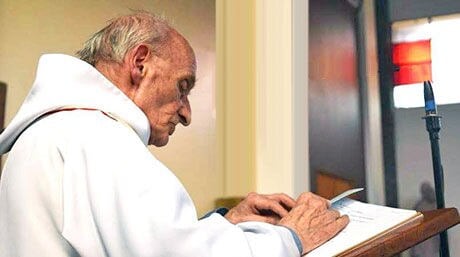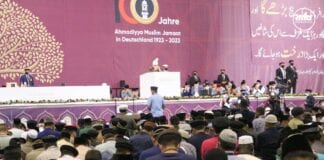A man of God does not belong to one people and for this reason the killing of a religious minister is, in many ways, a particularly heinous crime. It combines in it not only a callous disregard for human life, but also a hatred directed against God Himself and all creation, through Him.
What I have learned of Father Jacques Hamel was that he was a man dedicated to his community, dismissive of his advancing years and the reprieve offered by retirement. When encouraged by his fellow pastor Father Mputu Amba to accept his pension and shuffle off, Father Jacques replied laughingly, ‘Have you ever seen a retired pastor? I will work until my last breath.’
Many may have read this statement, but have perhaps not imbibed its true import. The word “pastor” has its origin in the Anglo-Norman French “pastour,” meaning “shepherd”. Being a Norman priest, he would have well known this. In this, Father Jacques was stating a truth that only a man devoted to his community could know: there is no reprieve for those who seek to serve others. He would work until his last breath, because he saw it as his duty to serve others, irrespective of his age.
The nineteen-year old criminal who killed him, Adel Kermiche, was shot dead soon after by the police. A picture is emerging of a troubled individual who had been hospitalised regularly for psychiatric reasons since the age of six. In this case, unlike others, warning signs were patently there of radicalisation. He had tried to flee twice to Syria and was jailed for the second attempt, though released awaiting trial. He had been banned from his local mosque and had threatened to attack a church only a few weeks earlier. School-mates describe him as a “buffoon” who never learned anything and who was “easily influenced.”
But this is, after all, the repeat pattern we are seeing. Young men, profoundly ignorant of Islamic teachings attacking innocent civilians in cities across the world. Kermiche had no idea, when attacking the church, that the Qur’an describes Christians priests and monks as “nearest in love” to Muslims, because “they are not proud.” He probably had no idea that in the Covenant with the monks of St. Catherine’s Monastery, as shown by Dr. Considine’s excellent research, the Prophet of Islam promised for all times that “whenever Christians, devotees and pilgrims gather together, whether in a mountain or valley, or den, or frequented place, or plain, or church, or in houses of worship, verily we are at their back and shall protect them…” He commanded Muslims that Christians “must not be offended, or disturbed, or coerced or compelled.”
He went on to command that Christian women must only be married with their consent and must be permitted to continue to frequent churches and follow their Christian faith. The oath sternly warns that “he who disobeys that which is herein…will be regarded as one who has corrupted the oath of God, disbelieved His Testament, rejected His Authority, despised His Religion, and made himself deserving of His Curse, whether he is a Sultan or any other believer.”
Adel Kermiche, undoubtedly, knew none of this. All he knew was a twisted understanding of Islam, taught to hate everything except itself; a view increasingly being adopted across the world by those who look on such senseless violence and despair.
In tackling such events, one of the key tools at our disposal is the media. This was a point powerfully made in the Spring Peace Symposium of the Ahmadiyya Muslim Community, by its Caliph, his Holiness Mirza Masroor Ahmad (atba). He emphasised how “the media plays a huge role in influencing public opinion,” arguing that “publicity is the oxygen sustaining most terrorists or extremist groups.” He asked the media to deprive extremists of airtime, and instead focus on rebuilding bridges between Muslims and non-Muslims.

Huzoor’s message is not limited to mere words. The weekend of 12th _ 14th August marks the 50th annual convention of the Ahmadiyya Muslim Community, in which 30,000 British Muslims will come together to denounce extremism and pledge loyalty to him, as their peaceful caliph, and the United Kingdom. It is especially poignant this year because it comes just days after the sentencing of Tanveer Ahmed, who murdered the Glaswegian Ahmadi Muslim Asad Shah earlier this year, in the first religiously-motivated killing of an Ahmadi Muslim in the UK.
The media is a powerful tool that can both strengthen and weaken extremist elements in society. Being one who sought to fulfil his duty to mankind till his last breath, Father Jacques Hamel understood the importance of words and their role in bringing about peace. He must have read the following words from Peter, many times in his eighty-five years. Today, more than ever, we need to follow this path to peace:
For, “Whoever would love life and see good days must keep their tongue from evil and their lips from deceitful speech. They must turn from evil and do good; they must seek peace and pursue it.
Peter 3:9-11
by Tahir Nasser




